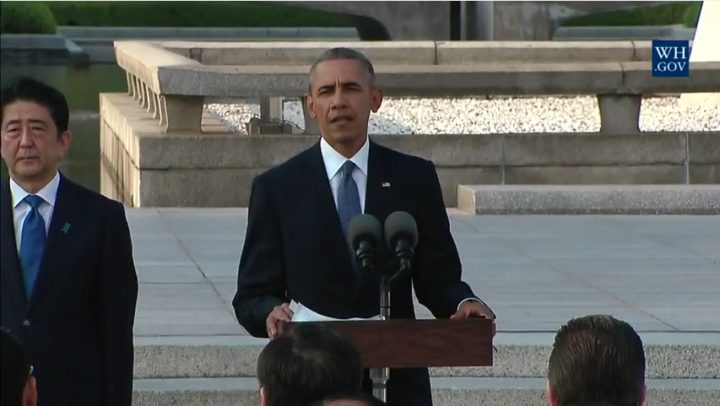President Obama made an historic visit to Hiroshima today—the first sitting US president to do so since the US atomic bombing of that city on August 6, 1945, followed three days later by the atomic bombing of Nagasaki.
As he did in Prague, in 2009, President Obama gave a very moving and meaningful speech about the impact of nuclear weapons, reflecting upon the experience of the victims of nuclear warfare—the Hibakusha.
“Their souls speak to us,” he said. “They ask us to look inward, to take stock of who we are and what we might become.”
In reiterating his call for a world without nuclear weapons, President Obama acknowledged that the suffering of the Hibakusha gives us “a shared responsibility to look directly into the eye of history and ask what we must do differently to curb such suffering again.” The very existence of nuclear weapons, he said, “fuels our moral imagination.”
These thoughts and words, though profound, have not been matched by US actions to eliminate nuclear weapons. To the contrary, the Obama administration is implementing a $1 trillion, 30-year program to build new and more usable nuclear weapons, along with more accurate delivery systems and the infrastructure to keep producing them well into the 21st century. This administration has done less to reduce the number of US nuclear weapons than any of its recent predecessors. Not only has the US failed to reduce its own reliance on nuclear weapons, it has induced other countries, including Japan, to rely upon US nuclear weapons for their own security. Hiroshima survivor Setsuko Thurlow has rightly called this extended nuclear deterrence arrangement with Japan an insult to the Hibakusha.
Moreover, while President Obama payed homage to the Hibakusha and to the victims of all wars, declaring that we must “reimagine our connection to one another as members of one human race,” the United States has boycotted a series of international conferences and the meetings of a UN working group with a mandate to recommend ways of doing things differently to achieve a world without nuclear weapons and to ensure that no other city ever suffers the fate of Hiroshima and Nagasaki.
All of the other nuclear-armed states—Russia, China, France, the UK, India, Pakistan, Israel, and North Korea—have paid similar lip service to the goal of a nuclear-weapons-free world, and all are engaged in their own large and expensive nuclear rearmament programs. All of them have boycotted the UN working group that is laying the groundwork for a new legal instrument to prohibit nuclear weapons based on their humanitarian impact. All of the nuclear-armed states, including the US, are turning their backs on the meaning of Hiroshima and the appeal of the Hibakusha.
When the US and the other nuclear-armed states stop doing everything they can to block a treaty banning nuclear weapons, and abandon plans to rebuild and perpetuate their nuclear arsenals, President Obama’s call for a world free of nuclear weapons will have meaning. Until then it is empty rhetoric.










